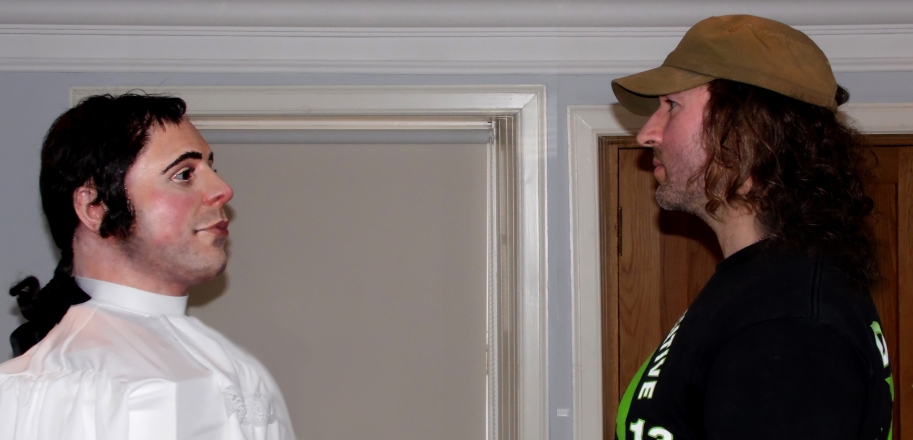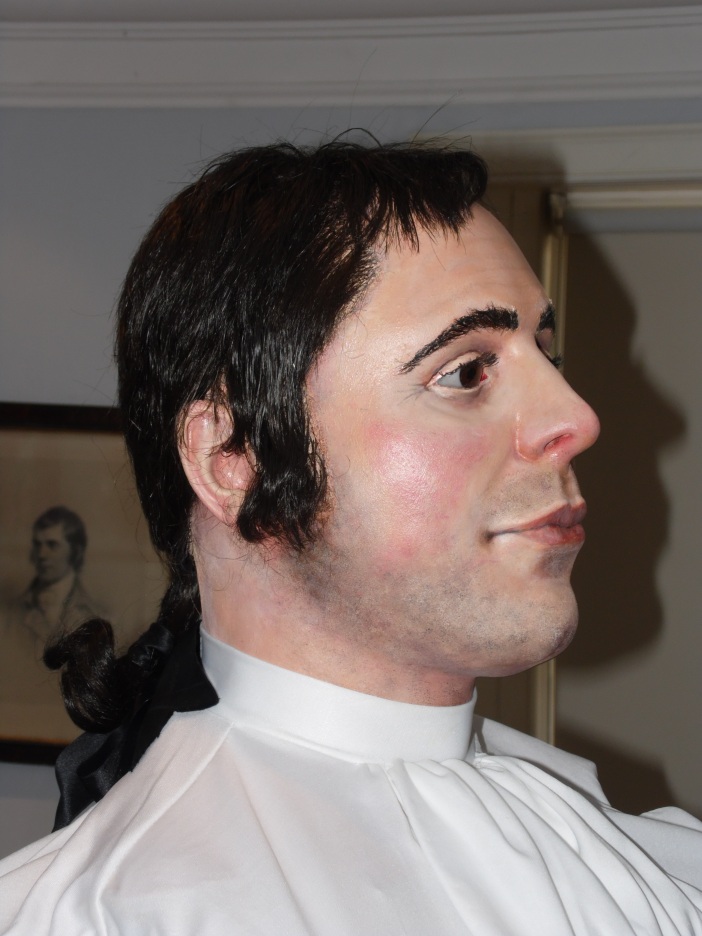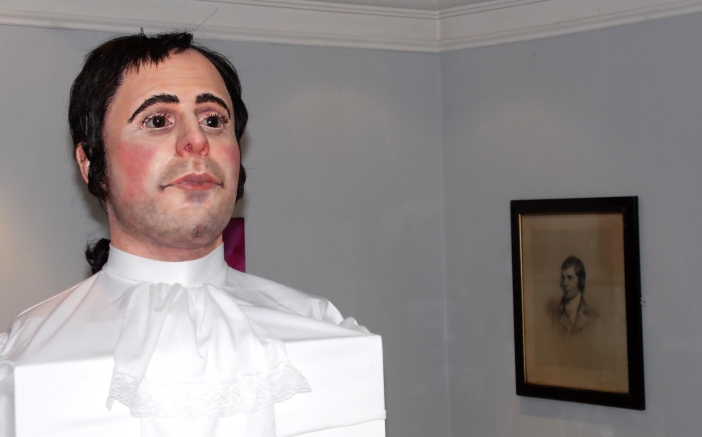A New Heid for a Deid Legend
Forensic experts at the University of Dundee created an accurate 3D depiction of Robert Burns’s head by using casts of his skull and contemporary portraits. I was lucky enough to look into his eyes, which seemed to look back with sentience. It was a profound experience.
A week before Burns night in 2013 I watched a documentary that told the head’s story, from the forensic team’s painstaking reconstruction through to the unveiling ceremony in Alloway, where Burns had set his supernatural Magnum Opus Tam O’ Shanter. Scottish actor David Hayman narrated the documentary, excitement audible in his voice as he waited for the head to be revealed. Something else was present in his speech too: awe. Would Burns look like the burly ploughman history tells us he was or would his appearance have an effeminate quality, as per some of the painted portraits? Would his face convey the Scottishness of his written work? Hayman was relieved upon seeing the results. Burns’s countenance – fleshed out using facial-reconstruction technology – had the characteristic look of a man o’ the land. More farmer than fop, he was beautiful in a hardy way.
As I gazed into the eyes of Burns, recognition bubbled to the surface: I know you. Perhaps the ubiquitous nature of Robert Burns in Scotland results in many Scots feeling that way. The Bard’s poems and their imagery became part of me as a child when I first experienced their magic. Standing face to face with the source of that magic, I recognised it as surely as I would my own reflection. Since my earliest memories, Burns’s words had been shaping my perception for the better. He and I share some characteristics: ancestry, culture and history; love of animals and countryside; refusal to accept hypocrisy; disdain for cruelty; an appreciation of short tartan skirts (“Weel done, Cutty-sark!”); a love of wild hochmagandy. Is it an accident that I grew up to embody many of the qualities that burned so passionately in Burns? Or did his ideas filter into the childhood me and find solace there, distilling until my soul – ever the stickler for truth – had weighed them up and invited the worthy ones to become part of my being? If I were a betting man I’d put my money on the latter.
Three days after sharing space with the head of Burns and spending time in the bedroom where he and Jean Armour conceived and birthed their ill-fated twins, I dreamed that I met the Bard walking across a meadow. We sat in the shade of a leafless oak tree. Burns pulled a silver hip flask from his pocket. After taking a few gulps, he offered me the container. I shook my head. The Bard shrugged then guzzled the remainder of the usquabae. His ponytail flapped in a rogue gust of wind. Gazing at the umber sunset, he said, “What do you think o’ humans?”
“The most destructive, despicable species on the planet,” I replied. “Ah’ve always known where Ah stand wi’ beasts. Not so wi’ folk. Horses relax in ma company and I in theirs. The same is true o’ camels, dogs, goats, wolves, pigs, cats, rabbits, coos, guinea pigs, hamsters…the list goes on. And for some reason moths come tae me as if Ah were a flame. A few years ago a friend’s eight-year-old daughter looked intae ma eyes and said, ‘You’re an animal soul in a human body.’ There was nae uncertainty in her voice. Maybe she was right. That would explain a lot. Ah love the company o’ wild things.”
“Aye,” said Burns, nodding. “Many a Clydesdale horse an’ moose an’ louse Ah looked in the eyes, an’ there Ah saw nowt but truth. In humans Ah e’er saw agendas.”
“Dear Bard, Ah learned much aboot honesty, integrity and compassion from you. Ah wish everyone had, but far too many folk are vessels o’ chaos, causin’ sufferin’ wherever they go. They’re strangers tae integrity.”
“Sounds like no’ much has changed,” mused the Bard.
“You’re right. Cowardice, cruelty and hypocrisy are as prevalent noo as when you were pennin’ poems that changed the literary landscape forever.”
“Are people treatin’ creatures better?”
“Some are, but idiotic humans still hunt and kill animals in the name o’ so-called sport. That’s murder, not sport. Something’s only a sport if both sides take part voluntarily and agree on the rules. Pullin’ a trigger and blowin’ a deer’s heid apart isnae sport – it’s deliberate murder of a gorgeous wild beast. Fishing’s no better. A human dunks a lure intae water as a Trojan-horse gift intended tae coax a poor fish tae its death. The one who’s unlucky enough tae bite has its mooth pierced by barbed metal, then the pain worsens as the creature’s yanked oot o’ water intae air, where the wee beauty begins tae asphyxiate. Overcome by panic and excruciatin’ agony, the beautiful bein’ flops aroon’ in a desperate attempt tae find its way back home tae the water. Then the creature’s gills collapse and it dies. Tae me, treatin’ any creature that way is unthinkable, compassionless, murderous, psychopathic. Fish are sentient beings wi’ feelings, instincts, families, social groups, intelligence, and a drive tae survive. Yet commercial trawlers net them in tens o’ thoosands, haulin’ them oot o’ the water tae an agonisin’ death.”
A tear trickled from the Bard’s left eye, catching the day’s last light. “Ah never thought much aboot the sufferin’ o’ sea creatures when Ah was tuckin’ intae them wi’ tatties and salt,” he said, his voice a breeze loaded with regret.
“Imagine other animals started treatin’ humans that way,” I said. “You’re walkin’ doon the street and a delicious-lookin’ scone wi’ jam and clotted cream materialises in front o’ your face. You take a bite, only tae find your cheek impaled by a hook. You’re pulled towards a river where a grizzly bear stands waist deep in water, reelin’ you in wi’ a fishin’ rod. When you’re within reach the beast grabs your heid and dunks it intae the river. You try tae free yoursel’ but it’s in vain – the grizzly’s strength is too much for you. Panickin’, you inhale. Water floods your lungs. Your body is starved of oxygen. Lactic acid burns intae your muscles. Above your heid the river explodes in a froth o’ bubbles then is still. You’re deid. If that were tae occur, you and I know that newspapers would run headlines like Bastard Bear Kills Bard. The media would shout, ‘Get a Gun, Gut a Grizzly.’ Oor ursine brothers and sisters would be hunted tae extinction. That has almost happened across the globe anyway. Back when you were writin’, bears, wolves and lynx roamed Scotland, but they were wiped oot by sociopathic numbskulls who disrupted the natural order. Too many humans are blind tae their own cruelty and tae that o’ their fellow man. Unawakened. Unenlightened. Unsentient. Unconscious. Not for all the money in the world would Ah cause sufferin’ tae a sentient creature. That’s ma way. Fuck it – that’s the way! You know it and Ah know it. What profiteth a man if he gaineth the whole world and forfeiteth his soul?”
“Ah never could thole the hypocrisy o’ religious folk,” said Burns, “but that wee chunk o’ Bible text is unco wise. If Ah’m no’ mistaken, your biblical namesake penned it.”
“Aye, he did. Marks make the best prophets. That’s scientifically proven.” As a tip o’ the hat to my favourite actor, Brendan Gleeson, I affected my best Irish (Oirish) accent and made fanny-tickling motions with my fingers. “Oi have the gift!”
“The jury’s oot on that one,” mumbled the Bard. “We’ll see.”
“We will, as you say, see.” A nod to Douglas Adams from me.
“You’ve soaked up ma compassion for creatures and filtered it through your cultural sieve,” observed Burns. “If Ah were aroon’ today Ah’d be a lot like you. Less quimthirsty, though.”
“What? Your shaggin’ exploits are legendary. And you didnae exactly dae it discreetly. You wrote poems and sonnets tae your lustiest lovethings then published them. At ma last count, you’d written odes tae eighty maidens! Ah figured if vagina-related recreation was the prime pastime o’ Scotland’s Bard, it must be worthy of exploration. In your words Ah found lucidity and on the Hochmagandy Highway Ah found carnal bliss. From Bard’s lips tae boy’s ears – joy can be found between the thighs of a warm, welcomin’ woman.”
“This is ma legacy?” moaned Burns. “Mount a lusty maiden and be happy?”
“Aye, but no’ just that. Your messages o’ brotherhood, compassion, wisdom and integrity are still resonatin’ across the land. You taught us it’s good tae feel, tae think, tae question, tae express. You also showed that fuckin’ can be fun.”
The Bard frowned. “You won’t find any mention o’ fuckin’ in ma written work. Ah wasnae uncouth in poetry or prose. Honest, raw and straight tae the point, but never coarse. Ah didnae just describe the mechanical aspects o’ fornication – Ah discovered that when carnality and love collide, the experience is greater than the sum of its parts.”
“Ah discovered the same thing, Rab. Pure, intimate love is the ultimate truth. Did you have a favourite lover? Jean, presumably? Was she your one?”
“Are folk still bletherin’ aboot the one? For me, there was always one. Then came another, followed by the one after that. And so on, ad infinitum, in gloria vaginis. Every woman Ah had true intimacy wi’ – and that’s a function o’ soul more than body – was ma one in that moment. Moments are ephemeral, though. Jean was one lover. Ah had many. Ah loved each o’ them wi’ unbridled passion. Tae declare any woman ma one would lessen the importance o’ the others. Most history tells lies. Mine cannae. Ah loved fiercely and widely. Each lover brought me revelations.”
My Oirish accent returns. “Are you sayin’ you’re a lover, not a foighter?”
“Somethin’ like that.”
Still Oirish. “Oi’m a lover, a foighter and a wroiter.”
“You’re an eejit.”
“You t’ink Oi’m not roight in the head?”
“Definitely no’ right in the heid.”
“That’s pretty much the consensus.”
Burns smiled. “An honest eejit wi’ a hertful o’ love and a soulful o’ compassion is worth more than all the gemstones and gold in the world.”
“Thank you, Rab. This eejit will e’er the truth speak, ne’er bowin’ tae fear or folly.”
“Good man,” said Burns. “Go forth and write, ma big hairy eejit friend. The world is your fertile furrow. Call on me if e’er you need advice.”
“Thanks but no thanks. As some rogue Scottish writer said in Revelation Was Wrong, ‘Those who ride through life on the coattails of others are not worthy of admiration.’ Forever Ah’ll admire your literary coattails, and the rest o’ your coat…and your troosers…and, och, you get my metaphor. Ah have tae plough ma own literary fields, though. Fresh ones.”
“Plough awa’, compatriot,” said the Bard. He stood up and offered me his right hand. I gripped it in mine. As Burns pulled me to my feet, I felt the strength of ages flow in an ancestral circuit. In that moment my roots felt deeper than those of the oak which sheltered us.


